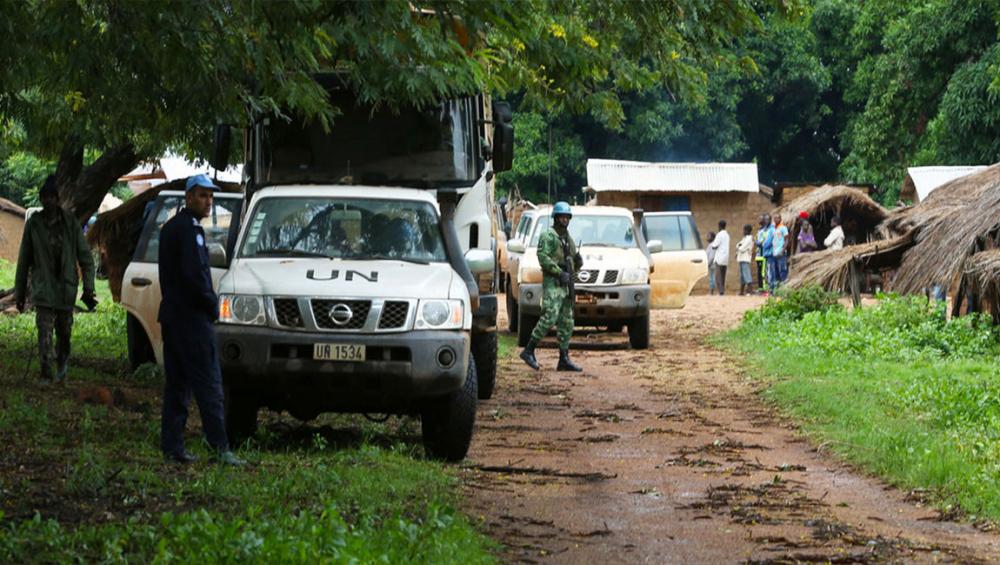Just Earth News | @justearthnews | 26 Oct 2019

New York(JEN): Updating the Security Council on the situation in the Central African Republic (CAR) on Friday, the head of the UN Mission in the country, MINUSCA, called on the country’s friends and partners, including the Council, to “transform the dreams of peace, prosperity and development of millions of Central Africans into a lasting reality”.
Looking back over events that have taken place since his last such briefing in June, Mankeur Ndiaye reiterated his observation that hopes have been raised, following the signing of a peace and reconciliation agreement in February, in the capital Bangui, the implementation of which has been a major preoccupation of MINUSCA. He outlined both the progress made, and the challenges faced by the vast nation.
Progress in peacebuilding, security and development
On the positive side, monitoring of the peace agreement is now operational at local and national levels, said Mr. Ndiaye, with MINUSCA helping to contain or avoid crises. In the town of Bossangoa, for example, Muslim civilians have been able to return home, and move freely, for the first time since large-scale inter-communal killings in 2013.
Special security units have now been launched in the north-west of the country, continued the MINUSCA chief, and the Government is planning to despatch similar units to the north-east and south-east of the country as soon as possible. It is expected that this will ensure the continued engagement of armed groups in the peace process.
In addition, disarmament, demobilization, rehabilitation and reintegration (DDRR) efforts have continued. Despite the reluctance of the 3R armed rebel group to participate, some 583 fighters have been disarmed and demobilized since December 2018.
The process of justice and reconciliation is also advancing, with the help of MINUSCA, said Mr, Ndiaye, and national consultations on a future Truth, Justice Reparations and Reconciliation Committee are ongoing in many parts of the country.
Another commission to examine the root causes of conflict in CAR, and propose justice measures, is also continuing its work throughout the country, and will present its report next month.
The national peacebuilding and recovery plan has seen progress, declared Mr. Ndiaye: with some 2,4 billion dollars released on October 1, funding of the plan has now reached over 67 per cent, and 400 projects, in several socio-economic sectors aimed at making a tangible improvement in the lives of CAR citizens, are now underway.
State authority continues to be extended, added the MINUSCA chief, thanks to the engagement of the Government, the UN and other partners. The number of officials on the grounds has doubled since 2015, 1346 members of the armed forces are deployed nationally, and 1050 police are present in 15 prefectures.
Challenges to peace and security remain
However, many challenges remain. Despite a halving in the numbers of human rights violations, attacks against civilians, sexual violence, restrictions on the liberty of movement, and kidnappings are still taking place.
Mr. Ndiaye noted his particular concern surrounding the tense security situation in the north-east of CAR since July. Fighting between two armed groups, the Movement of Central African Liberators for Justice (MLCJ) and the Popular Front for the Renaissance of Central Africa (FPRC), has led to many casualties, and the displacement of several thousand people. MINUSCA and other partners have been mobilized to end the violence.
Other challenges outlined by Mr. Ndiaye include the risk of violence linked to transhumance - seasonal livestock grazing - which starts with the arrival of the dry season; ongoing examples of illegal taxation; and the slow progress of laws associated with the peace process, notably those to do with decentralization and the status of former Heads of State.
Dealing with the root causes of conflict
The planned 2020/ 2021 elections in CAR should, declared Mr, Ndiaye, help to resolve the root causes of conflict in the country, reinforce democratic governance, and support the process of decentralization.
Authorities have already begun to prepare for the elections, adopting a new electoral code in July, preparing a new electoral map, and setting aside more than two million dollars to finance the poll. When added to the amount provided by the EU and other partners, the budget for the elections stands at around 41,8 million dollars.
However, the preparations remain threatened by a lack of technical, financial and human resources, said Mr. Ndiaye. MINUSCA does not yet have an appropriate logistical mandate, and ongoing insecurity is sowing doubt in the minds of the country’s political class. A major delay in elections could be damaging to democracy and peace in CAR, he warned, calling on the international community to provide an appropriate mandate, and the necessary funds.
MINUSCA currently has nearly 13,000 uniformed personnel serving the country’s five-year-old peacekeeping mission, aiming to restore security, and provide support for human rights efforts, following years of political upheaval.
Photo caption and credit:
MINUSCA/Leonel Grothe
UN peacekeepers in the Central African Republic patrol Ouham-Pendé in the northwest of the country.